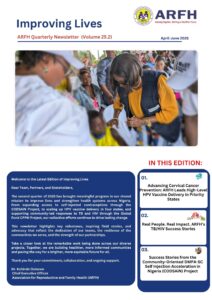
At a press briefing, experts have called on Nigerian government to honour pledges made at international forums, in particular to their FP2020 commitment which will ensure women of reproductive age have access to family planning commodities and reduce their risks unwanted pregnancies. ARFH as a member of Association for the Advancement of Family Planning (AAFP) is supporting the federal government to ensure universal access to free contraceptive commodities and increase the country’s contraceptive prevalence rate from 27 percent to 100 percent in support of moderating the country’s population.
The commitment will see Nigeria increase annual allocation to contraceptives to around $4 million and ensure total disbursement of some $56m to states through its Global Financing Facility and International Development Assistance loans.
The question is: what are we doing about these commitments and getting the message out,” said Ejike Oji, chair of AAFP board and a national focal person for the FP2020 movement. A large proportion of funding for contraceptive commodities and staff training comes from international partners.
The renewed thrust for family planning has been linked to the Economic Recovery and Growth Plan and the struggle to attain demographic dividend by careful planning to reduce dependent population and increase productive population.
Some experts have suggested deliberate limit on number of children couples can have, considering their economic ability—but have balked at how drastic population-control laws backfired in China.
“We are already overpopulated,” said Asmau Joda, on the AAFP board. “Every child extra is actually a lot. But we need to talk.”
Prof. Oladapo Ladipo, President of the Association for Reproductive and Family Health, is among experts who have consistently spoken of the benefits of smaller family sizes.
“There is wisdom in not having more than four children. The benefit is for the woman, the family and the society,” Prof. Ladipo said.
“We need to moderate our population growth to a level where we will benefit from the demographic dividend—where each family will have small extra money for investment that will support their need, guarantee good quality life, education, access to quality health services, good nutrition. We can only do that if we moderate our population.”
This story was culled from DailyTrust




